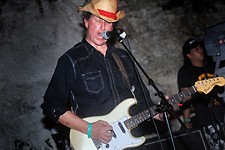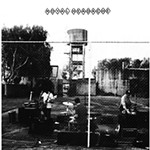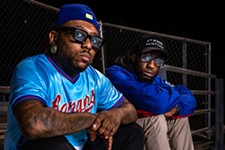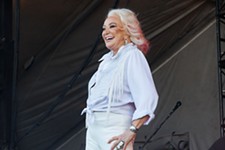Royal Headache’s Destructive Joy
Aussies pound out the The Breakfast Club of punk
By Raoul Hernandez, 10:00AM, Thu. Aug. 13, 2015
As powerful as the Buzzcocks, pop like the Jam, fast and melodic same as the Ramones, and youthfully explosive on par with Stiff Little Fingers, Sydney’s Royal Headache moshes populist perfection. The atomic punks’ Chaos in Tejas set in 2012 before the Clean at what’s now Cheer Up Charlies erupted. Expect the same Monday at Red 7 in a rare return.

Since moving back in with his mother recently, front vox Shogun (pictured far right) doesn’t normally schedule phoners at midnight. Not that there isn’t much to discuss: a punk-pop masterpiece in 2012 debut Royal Headache, actual follow-up Tight, and another unlikely U.S. tour. Yet after his night shift this Tuesday night – 9am in Austin – he’d planned a covert phone muffling only to find his parent awake, drinking white wine, and listening to Tears for Fears.
“So much for that,” he laughs.
Austin Chronicle: Still working a day job?
Shogun: Yeah, man. I work nights at a shitty call center. I’ve had the same job for 10 years. Pretty crappy, dead-end job.
AC: They let you off to tour?
S: Yeah, that’s one of the benefits of my job. I’m a casual employee, so they let me go when I tour, and they always have a job for me when I get back.
AC: A call center for what?
S: Aw, man, I’d rather not go into it. It’s fucking humiliating. Just imagine a shitty teenager’s job where you annoy people in their homes. It’s the lowest of the low, unskilled information labor. I’m not the most employable. I’m pretty work shy. I work on the phone and deal with customers. I mean look, it’s fine. Music’s my thing, so I’ve worked plenty of shitty jobs to stay in that, and probably always will.
AC: So the goal’s to work music full time and not have the shitty day job?
S: Whether or not it’s sustainable depends on the kind of music you’re making and who you’re making it with. Up to this point, at least, I’ve been happy for it to be the other way around – having any old job. Generally I only work four days a week, so I can spend the rest of the time writing and playing music.
AC: Could the music become sustainable at some point?
S: Maybe in the States you really can. There are a lot of places to play, and you can tour around. But I feel like in Australia it’s hard to make a living off touring because we have a lot of empty space here. There’s not a whole lot of little towns to play. Basically, if you have any respect for music, you probably don’t really dream of quitting your day job, because you’re going to have to make garbage. You’re going to have to make chart toppers, really.
That’s why a lot of bands move to the States or the UK. I don’t think many indie bands would consider that as a possibility here. It’s not really feasible. So it does keep bands a little more true to themselves, because instead of chasing a buck, they do their own thing and try and make the best music they can just for the sake of good rock & roll.
AC: Australia and Texas are similar in that there’s a lot of empty space here as well.
S: Texas is a funny one, isn’t it? I’m looking forward to going back, actually. I really enjoyed Austin. I thought it was cool.
AC: I was surprised Royal Headache played here for that first album. How did that come about? Was it simply Chaos in Tejas inviting the band?
S: We’d just been to the States for our first tour only five months prior to that. We weren’t playing a whole lot at that time. We didn’t really know how long we’d be touring. We didn’t even know how long we’d be together. We got asked to play Chaos in Tejas and didn’t think much of it, and then I had a look at the line-up, which had all these classic hardcore bands. I thought, life’s short and I don’t know how much longer we’re gonna be a band. Everything seemed uncertain, so I said let’s just go back now, because we may never go back again.
It’s funny. There’s always been this air of uncertainty surrounding Royal Headache. I think it’s probably my fault, being an indecisive person about what I want and whether I want to commit to something or whether I just want to do it for the time being. Even though the guys were like, “C’mon, man. We just went to the States,” I was like, “Let’s go back.” And the second tour was so much better than the first, because I think in the interim What’s Your Rupture had done the re-release of the record. The first time we’d play to 15-20 people, and the second time we were playing sold-out shows with people singing along and stage diving.
AC: We talked at Chaos in Tejas, after your set and before the Clean’s. You were jet-lagged – just off a 20-hour flight or something. What was your ensuing experience like in Austin? How was the gig, did someone take you to have Mexican food, etc., etc.?
S: The gig was really, really good. I think we were really frazzled and disappointed that we’d missed the first quarter of the tour thanks to visa bullshit. But I was really happy to be off the plane. Funny things happen to you when you get off a plane, because no matter how tired you are – even if you’ve only managed to pinch three hours sleep from the flight – the predominant emotion when you get off a long flight is you just really, really want to party [laughs].
Suddenly you’ve been invested with life and a bit of destructive joy.
It was pretty fucking magical, to tell you the truth, because as I said, the first tour was hit and miss. This show, there was loads of kids there stage diving and having a ball. It was wonderful. And then getting to see the Clean straight afterward. They were great. Then having a very long, debauched weekend, and winding up in some situation in downtown Austin at 5am and not knowing where I was and looking like I was in a bit of trouble, really, and having to ask for help.
I don’t know. It was all getting kind of sketchy, in a way. Just typical shit you get into when you’re traveling and don’t know what the fuck you’re doing. In Australia, you can get yourself shot basically [laughs].
AC: Here too.
S: Some dude helped me out, though [laughs harder]. It was fun.
AC: You said there wasn’t a great circuit of clubs in Australia, so I’m wondering if you got a sense of just how prolific the scene is here. That’s our slogan: Live Music Capital of the World.
S: I shouldn’t make it sound like Australia’s this ghost town. There’s plenty of places, and the nice thing is there are more now starting to open up just in the last few years after a period of a lot of music venues being shut down and turned into gambling dens. Full of what you guys call slot machines.
Sydney’s a really expensive city, and unlike Melbourne, it’s not particularly supportive of music or the arts. Everyone just wants to get the turnstiles going, so they closed down a lot of venues and filled them up with poker machines. That seems to be in the turn around.
I mean there’s loads of places to play in Sydney. Some more desirable than others. It still probably wouldn’t be anywhere near the amount as there would be in your average American city. I think the problem is that there’s only three large cities in Australia and one of them isn’t particularly large.
AC: Is the goal of any band ultimately to leave where they’re from and play out? Does it matter to you whether you’re playing for an Australian audience, or an Irish one – Japanese, wherever?
S: You know, we’re going to Europe next year, I believe. That’s the plan. I’d really like to, because, again, I think it‘s hard for us to see any kind of concrete plan about how long we’ll be doing this, so I want just want to do it all now. We’re going to the States, and then we’re going to Europe as soon as we can after that.
AC: So it sounds like you’re surprised there was even a second album.
S: Yeah. Umm, well. Yeah, definitely. I left the band for about a year and a half and I thought that was it. For a variety of reasons I picked it back up again. I think I just needed a breather, because we had such an intense period. I think I just got sick of the sound of my own voice. I think stylistically I started to feel pigeonholed into something. Always with the fast, whole punk sort of sound. I like a bit of variety, I’m not sure what it was.
I could go into detail, but for a million and one reasons I needed a break and walked out of the band for a while. I thought that would be it, but eventually we thought we should finish the [second] record just because it was half done. The guitars, bass, and drums were all tracked, so we started to work on it, and it began to sound better and better and we got excited about the band. Then we got asked to do Berserktown in L.A., so we thought, “Ah fuck it. Let’s do a gig.”
We started practicing and it was nice to be back. In terms of what was bothering me the first time around and caused me to leave, I’d just grown up a bit. I was careful that it didn’t bother me again this time. I was able to be grateful for something and enjoy it rather than to complicate it and become angry with it out of some spiteful, perfectionist spirit.
AC: You used the phrase destructive joy earlier to describe your previous performance in Austin and I thought, “That’s the perfect descriptor for the band’s music.” What’s the wellspring of that sound?
S: Some people start bands when they’re a little bit younger, and you find a lot of the greater punk groups are all teenagers. Stiff Little Fingers – a lot of those guys were 17, 18, 19. I was a little older when I joined. I was 27 – and that was six years ago. I’m getting on now.
Look, I think I wanted to create something that was almost a synthesis of, not all the music we’d ever listened to, but as much as possible. I felt that there’s a bleeding together of all the different bands. We used to hang out and have long, long nights and parties where we’d play black metal, then we’d play fucking disco and soul, and then hardcore, of course, and then play New Order, and psych music. It all seemed to fit together. They all belong on one disc.
I saw links between all these different styles of music, and I wanted to take soul music and Fifties rock & roll and squeeze it until it sounded like hardcore. I thought it’d make sense to people. It’s a bit like The Breakfast Club, where everybody has a bit of the jock, the cheerleader, the basket case. Every metal head can be a little sweet. Every punk kid can be a little bit soulful [laughs].
And also, being a punk thing kind of guy, you just get sick of all the divisions. This guy’s a hardcore kid, and this guy’s a skinhead, and you feel like saying to everybody, “Shut the fuck up.” You know? Let’s all have a drink together. It’s about maybe trying to create a unity between everybody, like a loud music that you could fucking stage dive to, and respond to with a lot of gusto.
AC: I never understood that about punk rock – all these rules and regulation wear. What is this, the military? This is a genre founded on do-it-yourself.
S: [Laughs] I know. It’s true. It became incredibly codified and I think punk lost its way very quickly. A lot of punk historians will probably tell you it was over by 1977. And here we are in 2015... [starts laughing].
I still love it, but it is such an incredibly contradictory genre, now more than ever, because you have hardcore bands that basically just adhere to these very strict characteristics. The whole thing seems like a parody even though there’s still some great punk and hardcore bands – again, now more than any other time in the last 10 years. There’s been a resurgence of some really good quality stuff.
AC: You’ve now toured the States twice and you said the second tour was better than the first. Do you then feel you’ve been successful in unifying all those types of music? Did you get punkers, and disco kids, and metal heads at your shows?
S: Here in Australia, I would say yeah. I’m not gonna give myself a big fucking round of applause, because I’m still not quite satisfied. I think we have a little way to go before it’s what I want it to be, but here in Australia’s it’s been wonderful, because we can play big shows. Everybody’s lively and people seem to get a rush off of it and have a good time.
We have a really mixed crowd, where we have, you know, maybe the more hip people, but we also have the skate boarders and reprobates and some of the more gnarly people come see us. I would have thought that maybe we’re a bit too saccharine or pussy for those people, but some of those guys fucking love it. I was flattered by that. That these rough and tough guys were coming to see Royal Headache and listening to the record and loving it.
AC: Most of the references to Royal Headache are the same: Fast and very melodic. Did you get many comparisons to the Ramones?
S: Not so often. I think the Ramones were a bit more steady. They had a blitzkrieg, but we’re a little faster and looser than the Ramones. Often people say the Jam. I would be as bold to say I don’t think we sound like any other punk band, really. All the musicians are self-taught and they have a funny way of playing. Sometimes it makes me turn blue in the face, because I’m a total music nerd, and I’ve been playing guitar nonstop since I was 13.
I’m a little more traditionally schooled, but these guys have a rough, quick, frenzied way of playing. It used to piss me off sometimes, because they’d go right out of control and I couldn’t fucking sing to it. Especially when I first joined. I couldn’t follow it. It was so fast and sloppy. They got better, but I learned to appreciate this weird, idiosyncratic way they have of playing. They won’t grow up, and I mean this as an accolade: They still sort of play like teenagers [laughs]. It’s kind of great.
AC: Sounds like there might even be a third album some day?
S: You know, I think there will be a third album. I want to see how this tour goes. We’ve only done three or four shows since we’ve been back, but they’ve all been really great. After all this time of being in bands for years and years and years, I just don’t want to count my chickens before they’re hatched. Just take it day by day. I want to see what people think of the record, because the first record was really, really great and I don’t know what people will think of this one. It’s a bit different.
It’s almost like the same experience through different ... The same ritual through different eyes, or a different personality. I think the first one was quite sparkly and bright. And innocent? And the second one; the last few years have been turbulent and difficult. It’s the same band, but more haggard with age. I like to think of the first one as innocence and the second one as experience.
AC: What’s that leave for the third one?
S: Ummm, good question. I’d just like it to be strength, and harmony, and resolve. Just an end to all the shit. I think the new record’s a pretty dark record. It sounds dark to me. It’s got a sense of thwarted hope, so I just want the third one to be strong. And optimistic. I also want to do some more psych stuff. We’ve been having some nice jams. It reminds me of the earlier Love records.
I think I can get really cynical about playing live. Sometimes I get this idea that it sucks and everyone hates it, and I don’t want to be there. It can be hard for me to believe that people out there are really, really getting into it. Like they might really be getting something out of it.
I did a gig the other night and felt myself getting dark about it and feeling like I didn’t belong onstage. You know, that I was just this piece-of-shit person, or whatever. Next time that happens I need to not get drawn into that circle of head noise, because it does sometimes attack me onstage. I need to remind myself that maybe there’s someone there that’s getting something out of it, and I should just get on with it and try and do my best. I need to have more respect for that, and not isolate myself, which I do sometimes when I’m performing.
America was really nice last time. We were playing in medium-sized venues, so you can see the kids. We played this really big venue the other night, and it’s good because people are still really getting into our stuff. We sold out an 800/900-person room, but I couldn’t really see the crowd, and we were playing songs from the new record that nobody knew. I thought, “Is this right? Have we passed it?” So I’m looking forward to playing slightly smaller rooms, and playing to people who haven’t seen us in a while.
I reckon I like playing away from home. Sometimes playing to a crowd of people that are all your friends gets a little weird [laughs]. It’s really nice to play to a bunch of strangers that are there to see you and like your record or they wouldn’t have come out that night.
A note to readers: Bold and uncensored, The Austin Chronicle has been Austin’s independent news source for over 40 years, expressing the community’s political and environmental concerns and supporting its active cultural scene. Now more than ever, we need your support to continue supplying Austin with independent, free press. If real news is important to you, please consider making a donation of $5, $10 or whatever you can afford, to help keep our journalism on stands.
Greg Beets, June 8, 2012
April 19, 2024
April 12, 2024
Royal Headache, Shogun, Ramones, Jam, Stiff Little Fingers, Buzzcocks, the Clean, Chaos in Tejas, Berserktown, Love










